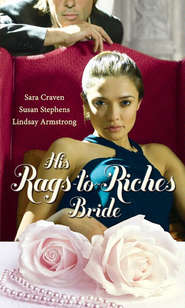По всем вопросам обращайтесь на: info@litportal.ru
(©) 2003-2024.
✖
The Virgin's Wedding Night
Автор
Год написания книги
2018
Настройки чтения
Размер шрифта
Высота строк
Поля
She squared her shoulders, then picked up her bag, and the shoulder case with her laptop, and headed for the door.
She was halfway down the corridor when she heard a burst of laughter coming from the office she was approaching, and recognised Jonathan’s voice.
‘I suppose I should feel guilty for knocking Flinty’s baby on the head,’ he was saying. ‘Especially as it’s the only time hell’s spinster is ever likely to give birth—to anything. Not even all Grandpa’s money would be enough to tempt a sane man to take her on. But, try as I may, I can’t manage one single regret. I truly feel she’d be happier in a back office, working the photocopier.’
‘You mean you’d be happier if that’s where she was,’ Anthea, his assistant, said over another sycophantic ripple of amusement. It sounded as if quite a crowd had gathered.
‘Infinitely,’ Jonathan drawled. ‘Maybe we should try it. Offer her a title—vice-president in charge of paperclips—and see what happens. After all, she’s only playing at a career. Old Gregory made that clear from the first,’ he added with a snap. ‘I bet he can’t believe she’s still here. And I can tell you that Tony’s well and truly sick of being saddled with her.’
Harriet stood where she was, lips parted in shock. This was more than the idle malice of the nicknames, she realised numbly. There was genuine entrenched resentment here. Jonathan Audley wanted her out, and it seemed he was not alone in that.
So, today wasn’t just a skirmish. It was the opening salvo in a war she hadn’t realised had been declared. And it had clearly hit the target.
Her hand tightened on the handle of her briefcase. She lifted her chin, then walked forward, halting at the half-open door. Standing there as the amusement faded into embarrassed silence. Glancing round as if she was taking note of who was there—collating names and faces—before walking on down the corridor, her head high.
But her hand was shaking as she pressed the button to summon the lift. Behind her, she heard a burst of nervous giggling, and Jon Audley’s voice saying, ‘Oops.’ A sixth sense told her that someone had come out into the corridor and was watching her, waiting, probably, for some other reaction, so she made herself lean a casual shoulder against the wall, glancing idly at her watch while she waited.
Thankfully, the lift was empty, and as the door closed she sank down on to her haunches, trying to steady her uneven breathing, fighting off the astonishing threat of tears, because she never cried.
By the time the ground floor was reached, she’d got herself back under control, and she’d at least be able to leave the building in good order.
Home, she thought longingly. My own space. My own things. A chance to regroup.
As she crossed the reception area, Les called to her. ‘That artist bloke has gone, Miss Flint, like you wanted.’
She swung round, confronting him almost dazedly, wondering what he was talking about. When she finally remembered, it was as if the incident had occurred in another lifetime.
She said curtly, ‘Good. I hope he didn’t give you any trouble.’
‘Not a bit, miss.’ He hesitated. ‘In fact he seemed a bit amused when I approached him. As if he’d been expecting it.’ He paused again. ‘And later, when I went out to check that he’d gone, I found this, fastened to the railings outside.’
He reached into a drawer, and with clear embarrassment handed her a sheet of cartridge paper, folded in half.
Harriet opened it out, and found herself looking at what seemed to be a mass of black shading. For a brief instant, she thought it must be a drawing of a bat—or a bird of prey. A carrion crow, perhaps, with wings spread wide, about to swoop.
And then she saw the face emerging from those dark flying draperies. A woman’s face—sullen—angry—driven. A caricature, perhaps, portrayed without subtlety, but, she realised, unmistakably—unforgivably—her face.
A deliberate and calculated insult—signed ‘Roan’ across one corner with such force that it had almost torn the paper.
For a long moment, she stared down at the drawing in silence. Then she forced a smile.
‘Quite a work of art.’ Somehow, she managed to keep her voice light. ‘Everything but the broomstick. And—fastened to the railings, you say? For all the world to see?’
Les nodded unhappily, his ruddy face deepening in colour.
‘Afraid so, miss, but it can’t have been there long. And no one from here will have spotted it.’ he added, as if this was some kind of consolation.
‘I think you mean no one else,’ she said quietly. She folded the paper, and put it carefully in her briefcase.
‘Are you sure you want to do that, miss?’ His voice was uncertain. ‘You wouldn’t like me to put it through the shredder?’
I’d like you to put him—this Roan—through the shredder, Harriet wanted to scream. Followed by Tony, and bloody, bloody Jonathan. And every other man who dares to judge me. Or force me into some mould of their making like Grandfather.
Instead, she shrugged a shoulder, feigning insouciance, although pain and anger were twisting inside her. ‘I intend to treasure it. Who knows? It might be worth a lot of money some day. He may turn out to be a future Hogarth. Besides, isn’t it supposed to be salutary to see ourselves as others do?’
Les’s face was dubious. ‘If you say so, Miss Flint.’
‘However,’ she added, ‘if I send you out to shift any more vagabonds, I give you full permission to ignore my instructions.’
She flashed a last bright, meaningless smile at him, and went out into the street, signalling to a passing taxi.
She gave her home address automatically, and sank back in the corner of the seat, staring unseeingly out of the window, feeling her heart pounding against her ribcage as her anger grew. As the whole day emptied its bitterness into her mind. Culminating in this—this last piece of ignominy perpetrated by a total stranger.
What the hell am I? she asked herself. Punch-bag of the week?
Mouth tightening ominously, she took out her mobile phone and punched in a number.
‘Luigi? Harriet Flint.’ She spoke evenly. ‘The painter. Do you know where he lives? If he has a studio?’
‘Of course. One moment.’
He sounded so pleased that Harriet felt almost sorry. Almost, but not quite.
She wrote the directions on the back of the card he’d given her earlier. When I thought things couldn’t possibly get any worse, she thought, as she tapped on the glass and told the cabdriver about the change of plan.
She would deal with Jonathan and co in her own good time, she thought as she sat back. But this so-called artist would answer now for his attempt to denigrate her.
Because, but for Les, this drawing would have been seen by the entire company on their way out of the building.
And she knew that it would not have been an easy thing to live down. That it was something that would have lingered on in the corporate memory to be sniggered over as long as she was associated with Flint Audley—which basically meant the rest of her working life.
Just as if she didn’t have enough problems already.
She took one last look at the drawing, then closed her fist around it, scrunching it into a ball.
Meanwhile, the cab was slowing. ‘This is it, miss,’ the driver threw over his shoulder. ‘Hildon Yard.’
And home, it seemed, to a flourishing road haulage company, and a row of storage units. Not exactly an artistic environment, she thought, her mouth twisting.
‘Will you wait, please?’ she requested as she paid the driver. ‘I shouldn’t be longer than ten minutes,’ she added quickly, seeing his reluctant expression.
He nodded resignedly. ‘Ten minutes it is,’ he said, reaching for his newspaper. ‘But that’s it.’
Harriet glanced around her, then, after a moment’s hesitation, approached a man in brown overalls moving around the trucks with a clipboard, and a preoccupied expression.
She said, ‘Can you help me, please? I’m looking for number 6a.’
He pointed unsmilingly to an iron staircase in one corner. ‘Up at the top there. That green door.’













